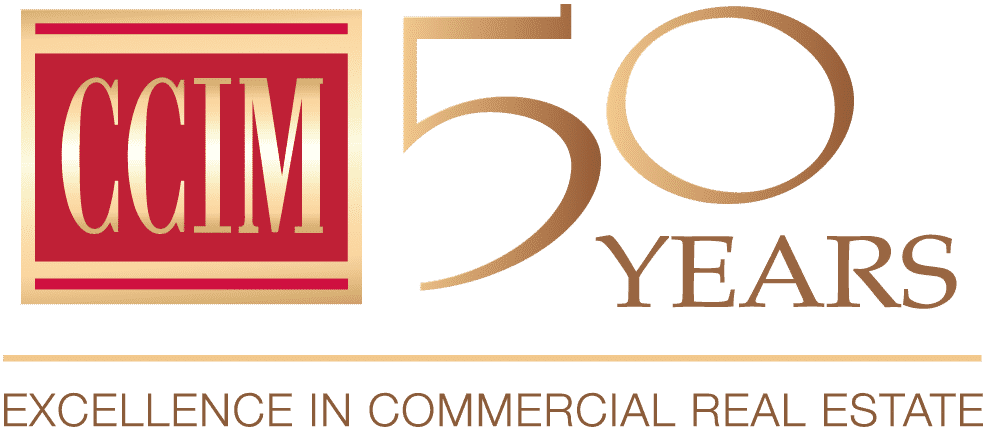After 26 years of being a residential real estate agent, managing broker, and real estate coach, I too have wondered if there is a massive benefit for me to get my CCIM designation. Instead of just sitting around and wondering, I decided to do the research and find out if getting a CCIM designation is beneficial for a residential agent.
So whether you’re thinking about adding a CCIM to work more commercial deals, or want to make the leap to full-time commercial agent, this guide should answer all your questions and give you enough information to make a decision one way or the other.
OK, let’s start at the beginning:
What Is a CCIM Designation?

CCIM stands for Certified Commercial Investment Member. It is a commercial real estate designation that represents that the holder has completed the CCIM educational requirements, passed the CCIM exams, and has completed the required commercial transactions proving that they have not only the knowledge but the experience necessary to handle commercial real estate investment.
CCIM graduates proudly represent their achievement by wearing a CCIM pin, often referred to as “The Pin.” Therefore, to be “Pinned” means that you have met all the requirements of the CCIM designation.
Making the Transition From Residential Agent to Commercial Agent
Before we dig into whether or not I think getting a CCIM is worth it, here’s a quick interview I did with Helen Chong, a former residential agent who is now the President of the Northern California Chapter of CCIM. In the video below, Helen shares her experience with shifting her business from residential to commercial investment and how the CCIM designation made that possible.
Now that you’ve heard from Helen, let’s take a look at the process of getting a CCIM to see if it’s really right for you.
How Much Does Getting Your CCIM Cost in 2022?

Well, there’s no reason to soften the blow here, so I’ll just say it. A CCIM costs over $10,000. That means the cost of the CCIM is more comparable to a year in college than a traditional real estate designation. Frankly, I believe that they want it that way. After all, the CCIM designation is designed to provide the consumer with confidence that the person wearing the pin has the commercial acumen to handle their real estate investment transaction smoothly.
That said, the costs of the CCIM designation can vary based on your prior experience and your current designations. Some classes can be “Fast Tracked” if you can show evidence of your commercial real estate-related education.
The table below is a list of costs assuming you are taking the traditional route of obtaining your CCIM without having a degree in real estate or prior certifications.
Cost of CCIM Courses
| Item | CCIM Member | Non-member |
|---|---|---|
| CCIM Institute Membership | $650 | $650* |
| CI 101: Financial Analysis | $1,200 | $1,735 |
| CI 102: Market Analysis | $1,435 | $1,735 |
| Negotiations Training | $370 | $475 |
| CI 103: User Decision Analysis | $1,435 | $1,735 |
| CI 104: Investment Analysis | $1,435 | $1,735 |
| Ethics Course | $0 | $49 |
| Electives (2 Credits) | $2,800** | $3,400** |
| Portfolio Submission Fee | $175 | $175 |
| Course Concepts 2-Day Review | $810*** | $810*** |
| Comprehensive Exam | $375 | $375 |
| Total Cost | $10,685 | $15,084 |
*CCIM membership is required to submit your CCIM designation portfolio application.
**The cost of the electives depends on the subject, delivery method, and the number of credits.
***Course Concepts 2-Day Review is optional.
Even though the educational costs are steep, Helen says it was well worth it for her. Helen has received over $50 million in just referral business alone, which she attributes to her CCIM designation. Helen also says that many are unaware of scholarships that are available to help offset the costs.
How Long Does It Take to Get Your CCIM Designation?

Since the CCIM courses are self-paced, how quickly you get your CCIM is dependent on your personal time commitment. The CCIM Institute states that “students typically complete the program in 1-3 years, we’ve had members complete it anywhere from six months to 10 years.”
A big reason that it takes some agents longer than others to finish their CCIM courses is that they don’t have a lot of prior commercial experience. This is because some of the course requirements are waived based on your previous knowledge and experience.
Do I Have to Be a Licensed Real Estate Agent to Get the CCIM Designation?
I’ll let Helen take this one: “No, you don’t. We have a lot of people from different trades get a CCIM, including CPAs, attorneys, corporate asset management, investors, appraisers, and so on.”
That said, getting your real estate license could give you a leg up since you’ll be more familiar with the homebuying and selling process.
4 Steps to Getting Your CCIM
Now that you have a better idea of what transitioning from residential to commercial is like and the benefits of having a CCIM, let’s take a look at the steps to getting your CCIM.
Step 1: Take the Required CCIM Courses

There are three main parts to obtaining a CCIM designation. The first part is completing the educational requirements, including four CCIM commercial investment courses, a negotiations course, an ethics course, plus a minimum of two elective credits. Traditionally, CCIM classes are held classroom-style throughout the country, but due to COVID-19, many of these classes are now available online.
Second, you must substantiate your commercial real estate experience by providing evidence of your years of experience working in the commercial real estate industry or personal transactions where you were the principal.
Lastly, you must pass the Comprehensive Exam to prove you have the knowledge required to hold the CCIM designation. I will explain all this in detail later.
CCIM Courses
CI 101: Financial Analysis for Commercial Investment Real Estate
This course provides the foundation for the later CCIM courses. In CI 101, you will learn about key financial concepts such as internal rate of return (IRR), net present value (NPV), cap rate, capital accumulation, and the annual growth rate of capital.
CI 102: Market Analysis for Commercial Investment Real Estate
In this course, you will learn to apply market and competitive analysis, political and legal analysis, site analysis, and financial analysis to make fundamental investment decisions. You will also learn how to perform geospatial analyses and forecast future demand.
Negotiations Training
Eight hours of negotiations training is required before you can continue to CI 103 and CI 104. This requirement can be completed either through the online Preparing to Negotiate course or the one-day classroom course Commercial Real Estate Negotiations.
CI 103: User Decision Analysis for Commercial Investment Real Estate
Here you will learn how to strategically evaluate occupancy, such as comparative lease analysis, lease vs purchase analysis, lease buyout analysis, and sale-leaseback analysis, to optimize decisions regarding use and occupancy.
CI 104: Investment Analysis for Commercial Investment Real Estate
In this course, you will learn to evaluate the entire life cycle of an investment, from refinancing to capital improvements to disposition. By applying decision-making analyses to optimize investment returns, you will be able to effectively forecast investment performance by quantifying risk and leverage.
Ethics Course
You will learn the Code and Standards of Practice of the CCIM Institute and complete and pass the online lesson quizzes and final exam.
Two Elective Credits
Two elective credits are required prior to taking the Comprehensive Exam. These can be earned by completing non-designation courses. There are several elective courses to choose from, ranging from .25 to 1.0 credit each.
Does the CCIM Institute Offer Scholarships?
Yes, scholarships are awarded through CCIM chapters and other scholarship sponsors. See the CCIM Foundation for more details.
Once you have completed your educational requirement, you will put together your commercial real estate portfolio to meet the CCIM experience requirements.
Step 2. Gather & Submit Your CCIM Experience Requirements

The CCIM designation is reserved for only those with the financial, analytical, and ethical education to do commercial real estate, but they must also have a proven track record of working on successfully closed commercial real estate transactions.
To apply for your CCIM designation, you must prove that you have had a “substantial involvement with real property of a commercial and/or investment nature.”
You will need to provide settlement statements, affidavits, and proof of employment (listing agreements are acceptable) to show evidence of your “qualifying activities” involving commercial real estate. The CCIM experience qualifications are subject to the number of transactions and total dollar volume.
3 ways to achieve the CCIM experience requirements:
- Three or more qualifying activities totaling $30 million or more
- Ten qualifying activities totaling $10 million or more
- Twenty qualifying activities without regard to total dollar volume
Qualifying activities are those that have taken place within five years of the portfolio’s submission date and in which you had substantial participation.
Qualifying activities are:
- Commercial real estate exchange/acquisitions/sales
- Commercial financial analyst
- Commercial investment real estate leasing
- Commercial mortgage financing of commercial real estate
- Commercial real estate consulting
- Commercial real estate development
All qualifying activities must be substantiated with documentation in your portfolio and then submitted to the CCIM Institute, which will be reviewed by a panel called “Graders.”
Step 3. Pass the CCIM Designation Comprehensive Exam

Once you’ve taken the CCIM courses and submitted your previous experience documents, you will sit for the Comprehensive CCIM Exam, which is typically held twice a year in the U.S. The exam is normally a full day, but if you feel you need more preparation, it’s preceded by the two-day Course Concepts Review, allowing you the opportunity to review the topics that will be covered on the exam.
A grade of 70% or better is required to pass. Graduates will attend the “Pinning Ceremony” that evening. However, if you fail the first time, you will have up to four chances to retake the exam.
Step 4. Get a CCIM Institute Annual Membership

Even prior to obtaining your CCIM designation, you may choose to become a CCIM Institute Candidate member. For an annual membership fee of $650 a year, it provides you access to commercial analytic tools, templates, and forms, as well as the CCIM Magazine. More importantly, CCIM Candidate members also receive discounts on the CCIM courses. Membership to the CCIM Institute is required to submit your CCIM portfolio and application.
Bottom Line: Is a CCIM Designation Worth It for Residential Agents?
Simply put: No. Unless you are deciding to change to commercial real estate as your main focus, the cost is just too high and the requirements are too steep if your focus is on residential real estate first.
However, if you do a substantial volume of commercial or investment deals and you have the money and time, then getting your CCIM can be a valuable asset to your business. If you’re a broker-owner who wants to branch out into hiring more commercial agents, then a CCIM could be beneficial to managing them.
An additional benefit of obtaining the CCIM designation is gaining respect from your peers and other commercial real estate agents. Knowing that you have your CCIM may put them at ease and they may be more willing to work with you and possibly send you referrals.
If you’re still interested in getting a real estate designation, but want something with a lower financial and time commitment, check out our list: 8 Real Estate Designations That Will Actually Make You Money or deep dives into ABR or CRS.
Over to You
Do you have advice about getting your CCIM? Please let us know in the comments, or if you’re an active agent, join our Facebook Mastermind Group here.





Add comment